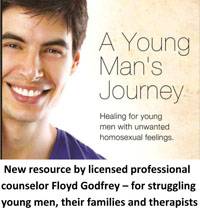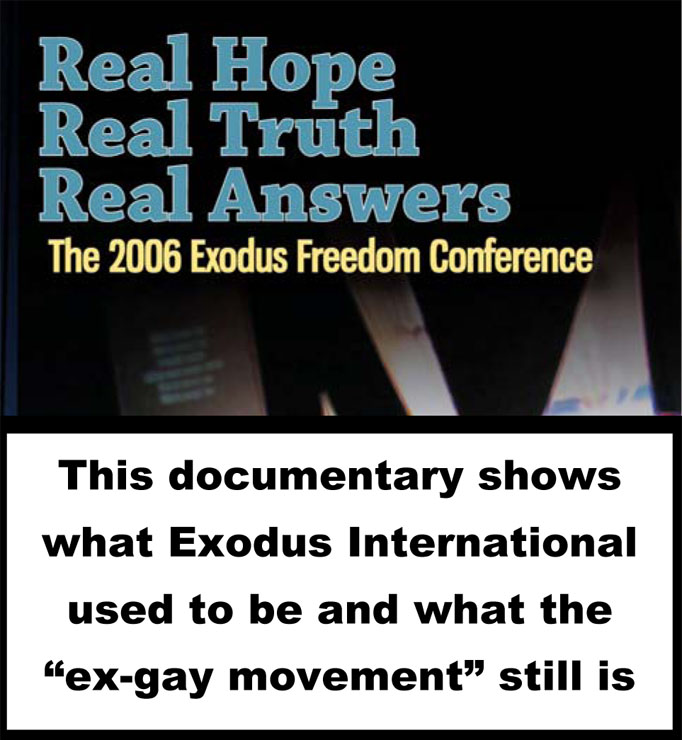Christopher Doyle discusses the quandary ex-gays present to the gay rights movement
February 27, 2013
Excerpts from Christopher Doyle’s opinion piece “The Ex-Gay Problem: You Can Never Leave?” on the Christian Post website: “‘You Can Check-Out Anytime You Like, But You Can Never Leave.’ So says the Eagles’ song Hotel California. Ironically, this memorable phrase in that 1976 classic hit has lasting implications for all those wishing to leave the gay life. I am careful to say ‘life’ and not ‘lifestyle’ so not to offend any gay and lesbian reading this who may be quick to cast me as a homophobe or hate-monger.”
“The truth is no one simply chooses to have same-sex attractions (SSA). These feelings are the result of many factors, mostly environmental and familial, mixed-in with one genetic factor, a sensitive temperament. I make this claim not with a preponderance of scientific evidence, but with the clinical experience of my own practice as a psychotherapist over the last three years, plus an additional twenty years of observations from my colleagues at the International Healing Foundation.”
“In twenty-three years, we have found that 99 percent of our clients who experience homosexual feelings have very sensitive temperaments. Or, as Lady Gaga says: ‘Baby, they were born that way!’ This is what I believe to be the foundation for the development of SSA – a sensitive nature. Factor that with a few other variables − usually detachment from the same-gender parent and peers, an over-attachment to the opposite-gender parent and peers, and early sexual initiation and/or sexual abuse – and there is a good chance a person will experience SSA.”
“For decades, most of the scientific community agreed. Until 1969, on the coattails of the Civil Rights Movement, when the modern-day gay rights movement began. On June 28, 1969, at a homosexual bar on Greenwich Village in New York City, a group of gay patrons finally had enough of the abuse by local police, who regularly came into their establishments and harassed and beat up the patrons. At 1:20am, the customers stood up against this police brutality, and for several days, fought the police in what was eventually known as the Stonewall Riots. This was the spark that lit the fire throughout America, igniting the modern-day gay rights movement.”
“From this time on, national groups began to spring up, including the Human Rights Campaign, Lambda Legal Defense Fund, and the National Gay and Lesbian Task Force. Their goal was to emulate the strategies of the Civil Rights movement to gain acceptance for homosexuality and change public opinion in America.”
… “it’s common for activists to claim that ex-gays are merely repressing their sexual urges and choosing to engage in heterosexual sex. If a former homosexual relapses, they then point to this example and generalize it to the entire ex-gay community as proof that change isn’t possible. Another argument they use to defame ex-gays is to say he/she was never really gay – therefore, if they weren’t gay to begin with, they didn’t really change. All you have to do is read the comment section at the end of this and any other article I’ve written, and any number of these strategies will be employed to disqualify my experience and those of the ex-gay community.”
“My personal favorite, however, is the oldie-but-goodie, ‘you’re just a big mean liar and you didn’t change at all – you’re still really attracted to dudes – and you’re only pretending not to be gay because your Bible-thumping family and Christian upbringing caused you to internalize your homophobia and resort to self-hatred . . . you’re really denying who you are – what a sad, pathetic life you lead.’”
“Even though I’ve been married to my wife for over six years, have three beautiful children, and have not relapsed in eight and-a-half years, these activists claim that I, and others like me, am still homosexual. In essence, you can check out anytime you like, but you can never leave.”




